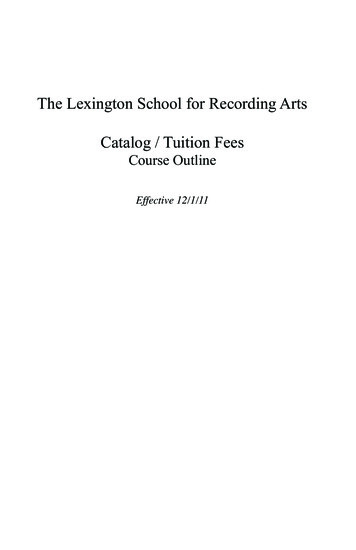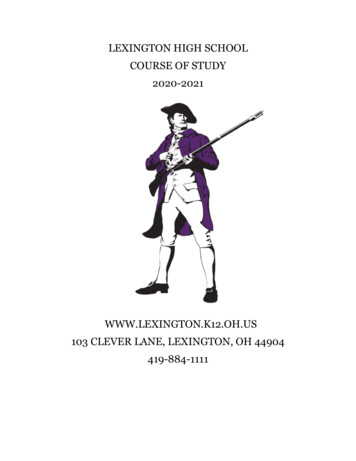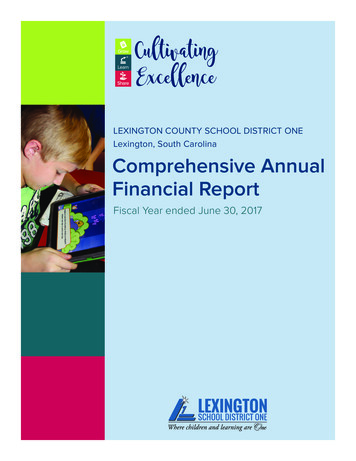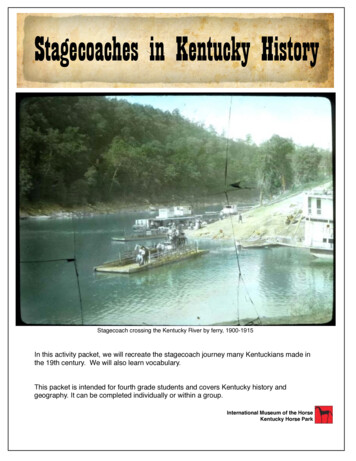
Transcription
The Lexington School for Recording ArtsCatalog / Tuition FeesCourse OutlineEffective 12/1/11
LSRASchool Year 2011-2012Volume Seven, revised December 2011Board of Directors, Officials & FacultyWil Freebody, PresidentJames Cooley, Board Member/AdvisorKeith Caudill, Board MemberTerrance Young, Board MemberDoc Messina, Board Member/InstructorAmber Sloan, VP of School OperationsCarolyn Austin, VP of AdministrationMichael Thomas, InstructorSteve Nall, InstructorErin Cheeks, InstructorPatrick Hairston, InstructorEric Rolph, InstructorByron Turner, Instructor“Our attention has been and will remain focused onthe individual student’s needs”
LSRA CatalogTable of ContentsPage OneBoard of Directors, Officials,and InstructorsPage TwoMessage from PresidentPage ThreeCourse DescriptionAE-1- Audio EngineeringPage FourCourse DescriptionEP-1 Elements of ProductionDM-1 Digital MediaPage FiveCourse DescriptionAE-1I- Audio EngineeringMT - Music TheoryPage SixAdmission RequirementsTuition Refund PolicyPage SevenCourse OutlinePage EightRegistration feesPage NineImportant datesClass Start DatesPage TenStudent ExpectationsAttendance PolicyMake-up PolicyPage ElevenUnsatisfactory GradesRe-Entry RequirementsStudent Records
Message from PresidentWelcome toThe Lexington Schoolfor Recording ArtsYou have made an important decision to further your knowledge about Audio Engineering and Music Video Production. Our goal is to present the basic understanding of the science and manipulation of sound and image. Westrive to provide a professional, comfortable and relaxed atmosphere conducive to the learning process. Our two-year program constitutes the basisfor the blending of science, art and business. Graduates leave us prepared,confident and ready to enter the exciting world of show business.This manual covers important information about the facility, the course andexpectations we have of you, the student. After reading this manual thoroughly we encourage you to question anything you don’t completely understand.Nobody gets to live life backwards, look ahead, that is where your futurelies. Our entire team is anxiously waiting to get you started on this fantasticjourney.“Live as if your were to die tomorrow. Learn as if you were to live forever”.-- GandhijiLexington School for Recording ArtsCatalogPage 2
Course DescriptionsAE-1.1Audio Engineering Course(See admission requirements)This is our core program. This course must be successfullycompleted before the student can continue in other offerings.This course is a comprehensive learning experience designed togive the student a complete understanding of the art of recordingand mixing in both digital and analog formats.The course includes the following topics:The functions of the CPU, memory, hard disk storage technology, andinput and output peripherals. Guided tutorials take students throughbasic computer operations, setup of interfaces with peripherals,and the formatting of storage media. In addition to working withindustry-standard digital editing software, students also learn basicword processing and graphics applications.The proper use of both out board and plug-in equipment; effects,parametric and graphic EQ, digital delays, gates, limiters,compressors, line levels, bussing, microphone magnetic fields andplacement, and both digital and analog mixing console operation.In addition to the science of sound, instruction will be given on theexpected attitude and behavior of a professional audio engineer.Included in this section; dealing with clients, musicians/singer,preparing for an audition (potential job hunting), selection of theproper internships to further the students individual goals.Page 3CatalogLexington School for Recording Arts
EP-2.0Elements of ProductionPrerequisite AE-IMust have access to a computer and internet.The Elements of Production course is a succinct curriculum consistingof music law, copyrights and contracts, music psychology, time andmotion studies, history of production, charting, functional business,concert promotion/production and of course “in the studio” musicproducing.This course will offer comprehensive knowledge of equipment,choosing the right equipment for the project, in depth coverage ofdigital media for both live field production and studio production.The course will offer knowledge in administration techniques,such as outlining, styles, formats. Creating effective time linesand budgets. The course will explore the psychological aspect ofperformer/producer relationship.DM-2.0Digital MediaMust have digital still camera, digital HD video camera, access to acomputer with required software (Photoshop/Photoshop Elements/ FinalCut Express)The Digital Media course includes six modules of interest. DigitalEquipment Basics will cover digital equipment, hardware and softwareused in the process of editing. Photoshop Basics will cover basic knowledgeof the software and general editing techniques. Digital creation of MusicVideo portion students are taught recording, manipulating digital videofootage. Stage lighting, live sound properties and stage hand techniquesare areas covered as well.Lexington School for Recording ArtsCatalogPage 4
AE-2.0Advanced Audio Engineering CoursePrerequisite AE-IMust have access to a computer and internet.A nine-week course, divided into two modules. First culminatingwith a Waves Certification in the following plug ins: RenaissanceEQ, Renaissance Compressor, C1 Parametric Compander, Renaissance Reverb and Super Tap Delay. (Waves is the world’s foremostdeveloper and supplier of software-based audio signal processingtools). The last module focuses on the final step in the recordingprocess the act of creating the matrix (master) from whichall copies will be made. Historically, the mastering procedure wasa conversion process from tape to vinyl. Today the entire processcan be achieved entirely within the digital format. The Master Engineer is revered as the ultimate authority in audio engineering. Thiscourse will educate you using sophisticated techniques in all aspectsof audio signal processing: including advanced equalization, compression, limiting, normalization as well as, widening the stereo image, editing fades, and many other necessary tools of the trade.MT-2.0Music Theory ModulesMusicians need to know the basics of Music Theory. We offer thiscourse in three modules. Each one advancing further into the worldof Music Theory. Learn about all the elements, rhythm, timbre,melody, textures, etc. Explore different classifications of music such asWestern, Classical, Jazz, etc. Learn practical application with variousinstruments. A successful completion of all three modules will resultin the student being presented a certificate of completion in MusicTheory.Page 5CatalogLexington School for Recording Arts
Admission RequirementsHigh School Diploma or equivalency is required. If the student hasnot achieved a high school diploma or equivalency, a LSRA entranceexam is available upon request. A passing grade on the entrance examwill allow the student entry into the course. Students will receivecredit for previous education and training that directly correspondswith the student’s Audio Engineering program as determined by aschool’s official. Credit will be granted on an hour-to-hour basis.Thus, the training program will be shortened accordingly. Veteransare required to submit all transcripts from other institutions theyhave attended so that a complete evaluation of credit for previouseducation and training can be assessed.Tuition Refund PolicyWe make every effort to ensure that the enrolling student is the rightfit for our School. Students enroll in our school because of a desireto further their knowledge surrounding their love of music. Due toour limited facilities, students will not be entitled to a refund if theyvoluntarily withdraw. If the student does not attend school for aperiod of four weeks without communication, it shall be deemedthat the student has voluntarily withdrawn.Lexington School for Recording ArtsCatalogPage 6
Course Hours2424242424Audio EngineeringAnalog TheatreIncluding use of Dynamic Compression and gatingDigital Board Time – Studio A & BIncluding use of Dynamic Compression and gatingPro-Tools Digital Audio WorkstationMicrophone Placement/Proper signal levels for RecordingSession RecordingAudio Engineering II (Mastering/Waves)Introduction to the Waves environmentIntroduction to the Mastering EnvironmentIndividual Project Mixing SessionsElements of ProductionHistory of Modern ProductionMusic BusinessIncluding outlining, time lining, basic stylesPsychology behind the musicStaging a performance, prepare for studioAdvanced Theory - ChartingIntroduction of studio and live productionCovering media, equipment and l Equipment BasicsGeneral overview of hardware/softwarePhotoshop BasicsGeneral overview of Photoshop/digital editing softwareDigital creation of Music VideoPreproduction through final output of Music VideoStage and Video LightingDM-512Live SoundMTHoursMT-124MT-224MT-324Page 7CatalogDigital MediaMusic TheoryNotes on a piano, Building Chords, Modes,Major/Minor ScalesTime Signatures, Rhythm, Tempo, Parts of Songs,Composer researchSkills learned in 1 & 2 are applied, form basic songstructure, write chords by listening, music history.Lexington School for Recording Arts
RegistrationUpon meeting admission requirements and receipt offees (see below), a schedule will be planned based on thestudents’ schedule and the availability of the instructor(s).Some courses will run concurrent and some consecutive.ProgramNo.ProgramLength*Tuition CostMaterialFeeAE-1.132 Weeks 8,900.00 175.00AE-1.28 Weeks 10,000.00 175.00AE-2.110 Weeks 4,900.00 400.00EP-2.124 Weeks 8,900.00 125.00DM-2.124 Weeks 8,500.00 125.00MT-2.112 weeks 850.00 75.00MT-2.212 weeks 850.00 75.00MT-2.312 weeks 850.00 75.00*Program Length is approximate. It is the minimum amount of timeneeded for student to complete the course and earn a certificate.Material FeeThe material fee covers the cost of the Course Manual(s),a Student Identification Badge (required when student is in thefacility), one (1) LSRA tee shirt, one (1) headphones and othermaterials required throughout the course.Replacement cost of the materials:Course Manual 35.00Student Badge 35.00T-Shirt 25.00Headphones 50.00Lexington School for Recording ArtsCatalogPage 8
2012 Important Dates2012 HolidaysThe facility will be closed to observe the following holidays.January 1-8 - New Years (Winter Break)May 26-28 - Memorial DayJuly 4 - Independence DaySeptember 1-3 - Labor DayNovember 21-25 - ThanksgivingDecember 17 - December 31st - Christmas/NewYears2012 In-Service DatesThe facility will be closed to students. Teacher in-service day.January 4-6, April 6, July 5, September 11, December 5Class Start DatesEach student enrolled in all courses, will be provided with a tentativeschedule of classes for the course, which will include any additionalbreaks scheduled, besides the holiday breaks scheduled above. Eachstudent will typically start with the core program, Audio Engineering.Other classes will be scheduled either concurrently or consecutive.Classes start in the Spring, Summer, Fall and Winter.Page 9CatalogLexington School for Recording Arts
Student ExpectationTo receive the most benefit from the course(s), we expect studentsto attend the scheduled days for the scheduled hours. The course(s)are structured to present the student with the tools necessary and theknowledge required to successfully complete all the courses offered.Attendance PolicyIt is the goal of LSRA to have every student adhere to his or her prearranged schedule. Regular attendance is critical to the success ofthe student. When absences are necessary students are asked to call(859-335-6075) as soon as possible. When no communication ismade about absences, this will be considered un-excused absence.Excused absences are absences scheduled in advance, absencessupported by Doctor statement, etc. Students that accumulate five(5) consecutive un-excused absences for part-time student, three(3) consecutive un-excused absences for full-time student, will beconsidered voluntarily withdrawn from the course. Three (3) timestardy will equal one (1) unexcused absence. Any student requiringa Leave of Absence must submit a written request indicating reasonfor absence, length of absence and expected date of return.Make-up Work PolicyMake-up work is allowed at the discretion of the instructors.OrientationIncoming students, for all courses, will be required to attendSchool Orientation that will be scheduled a week or twobefore classes start.Lexington School for Recording ArtsCatalogPage 10
Unsatisfactory GradesWhen a student is displaying unsatisfactory progress in the course,not related to absences, the student will be placed on an academicprobation (2 weeks for full time student, 4 weeks for part time student). Every effort will be made to assist the student ensuring thegraduation and certification of a qualified audio engineer. If thegrades are not brought up to satisfactory progress (70%), studentwill be terminated.Re-entryIf a student fails to communicate with LSRA about un-excusedabsences (see Attendance Policy), the student will be consideredvoluntarily withdrawn. Students terminated for failing to meetsatisfactory grades (see Unsatisfactory Grades page 4), must complete a 30-day suspension period before applying for re-entry intothe course. If after this time the student wishes to continue in thecourse, the Board of Directors will consider the request.Student RecordsStudent Records such as project grading, regular attendance, Special Event participation, registration, etc. will be maintained at theschool and be available upon request.Page 11CatalogLexington School for Recording Arts
Lexington School for Recording Arts Catalog Page 4 EP-2.0 Elements of Production Prerequisite AE-I Must have access to a computer and internet. The Elements of Production course is a succinct curriculum consisting of music law, copyrights and contracts, music psychology, time and











